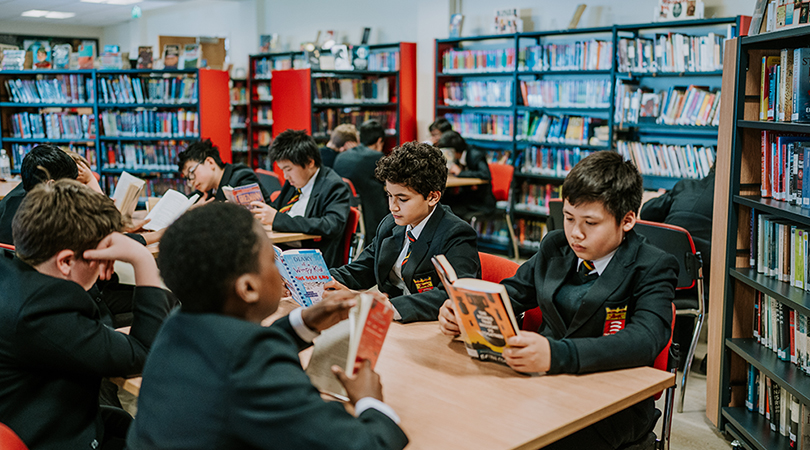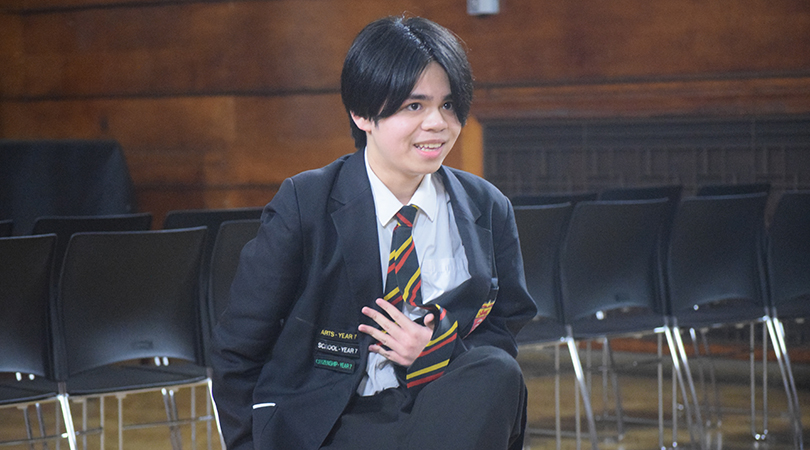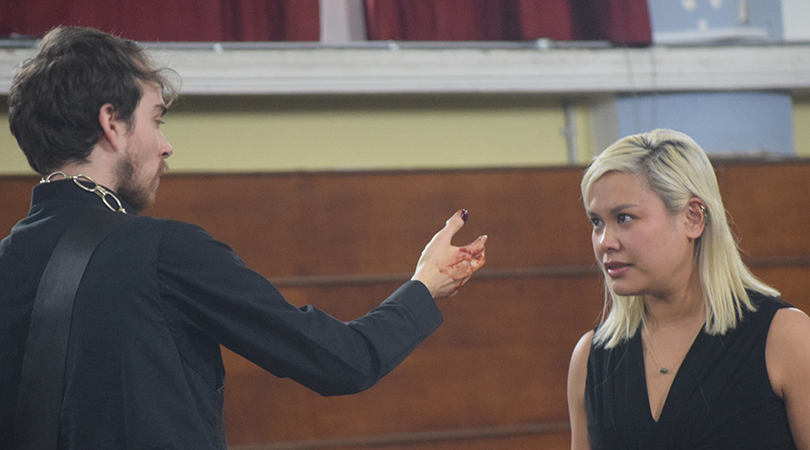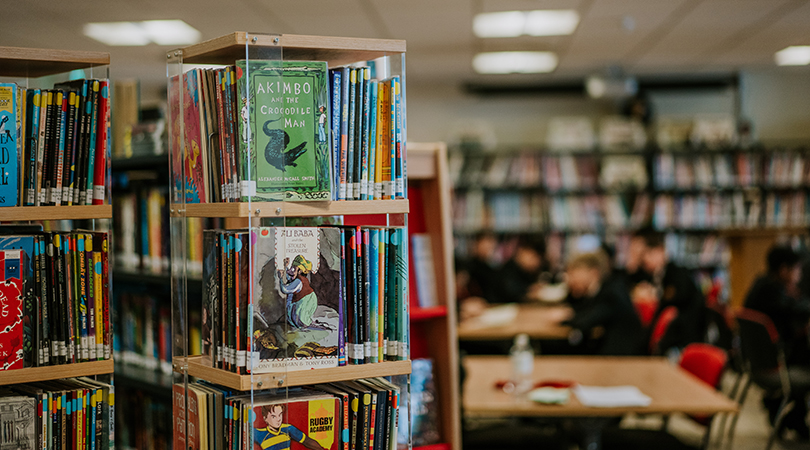 All students are encouraged to develop a love of reading for pleasure - including reading for 20 minutes each night.
All students are encouraged to develop a love of reading for pleasure - including reading for 20 minutes each night. Students regularly enjoy public speaking opportunities such as Poetry by Heart and the ESU Performing Shakespeare competition!
Students regularly enjoy public speaking opportunities such as Poetry by Heart and the ESU Performing Shakespeare competition! The department hosts travelling theatre companies to bring set texts to life.
The department hosts travelling theatre companies to bring set texts to life. Our library is well-stocked; students also have access to hundreds of thousands of free e-Books.
Our library is well-stocked; students also have access to hundreds of thousands of free e-Books.
Summary
Curriculum Content
Curriculum
Culture and Identity
This unit of work centres on the study of ‘The Bone Sparrow’ by Zana Fraillon. A range of poetry from a variety of cultures is also studied.
Creation and Origin
This unit of work aims to build students’ cultural capital through the study of several myths and legends from a range of times and cultures, from ancient Greece to African creation stories. Students will also study a playscript version of Mary Shelley’s Frankenstein alongside excerpts from the original novel during this unit of work.
Genre Study: Gothic
Students’ study of ‘Frankenstein’ forms a bridge to their exploration of the gothic genre. Texts by significant Gothic authors, such as Edgar Allan Poe and Susan Hill, are studied to discover the conventions of the genre; students are then explicitly taught how to apply these tropes in their own creative fiction writing.
Inspirational Voices
Students explore a variety of narrative perspectives, initially by studying inspirational voices such as Martin Luther King’s ‘I Have a Dream’ speech and more contemporary figures such as Malal Yousafzai. Students learn about different types of texts and will prepare a presentation to deliver to the class on someone that inspires them. Writing to persuade and express a viewpoint is taught explicitly in this part of the curriculum.
Assessment
Culture and Identity
Students will complete an assessment based on their study of ‘The Bone Sparrow’ and the issues that it explores. They will also be assessed later in the term on the analysis of a poem.
Creation and Origin
There will be a knowledge-based assessment of the tropes of Myths and Legends in half term 1. The ‘Frankenstein’ assessment focuses on language analysis of an extract and moral evaluation of characters.
Genre Study: Gothic
This unit is assessed through the end of year examinations. The reading assessment tests students’ comprehension, language analysis, and recognition of gothic features in an unseen extract. The writing assessment tests students’ ability to create their own gothic story.
Inspirational Voices
Speaking and listening is assessed through students’ preparation and delivery of a presentation on a ‘legendary voice’ of their choice.
Progress & Preparation Activities (PPA)
A schedule of Preparation and Progress Activities is given to students at the beginning of each unit of work. They can also be viewed on the school website and monitored by parents/carers via the Parent Portal. Students are expected to complete one piece of PPA per week in addition to 20 minutes of independent reading every evening. They are expected to complete quizzes regularly on the Accelerated Reader programme to reach their half-termly targets, and so that we are able to track and monitor their progress.
Further Resources
The school has a subscription to The Day, an online news service for schools. Click the button to the right, then browse ‘Subjects’ in the top menu to find English resources.
Please see below for a number of resources to maximise students’ progress during their Year 7 curriculum.
- BBC Bitesize: KS3 English – this website provides helpful activities that support students’ development of English Language
- BBC Bitesize: KS3 English Literature – This website provides helpful information and activities that support students’ development of English Literature
Curriculum
History of English
Students will be introduced to a number of writers who have had significant influence historically and are recognised as being part of the English Literary Heritage. This includes the study of the Old English poem ‘Beowulf’, extracts from Geoffrey Chaucer’s ‘The Canterbury Tales’, and excerpts from Romantic poets and Dickens. Students also learn how the English language has evolved to become what it is today, as well as how and why it is constantly changing. Students then conduct an in-depth study of the dystopian unit through extracts and short stories; writing to describe and narrate is explicitly taught within this section.
Justice
The first part of this unit of work incorporates the exploration of a range of non-fiction texts around the theme of justice, alongside explicit teaching of writing persuasive and balanced non-fiction texts. The second part of the unit is a study of Shakespeare’s ‘The Tempest’, with particular focus on justice and power dynamics between different characters.
The Detective Genre
Students study the 21st century novel Trash by Andy Mulligan to explore features of suspense, multiple narrative voices, and contextual influence. Students then explore the conventions of the detective genre further by studying extracts from a range of texts, some of which were first published in the 19th century. Students read extracts from Sherlock Holmes and short stories by Roald Dahl.
Assessment
History of English
The first assessment of Year 8 will involve a knowledge assessment of different periods of English literary heritage, alongside language analysis of an extract they have previously encountered. Students are assessed in Autumn 2 on the quality of their creative fiction writing, inspired by the Dystopian genre.
Justice
Students will be assessed on their non-fiction writing and reading comprehension in Spring 1. ‘The Tempest’ assessment focuses on language analysis and character evaluation.
The Detective Genre
The end of Year 8 reading examination is based on ‘Trash’: students are tested on analysis of an extract, and exploration of theme. The writing examination is a persuasive writing task inspired by the themes of the novel.
Progress & Preparation Activities (PPA)
A schedule of Preparation and Progress Activities is given to students at the beginning of each unit of work. They can also be viewed on the school website and monitored by parents/carers via the Parent Portal. Students are expected to complete one piece of PPA per week in addition to 20 minutes of independent reading every evening. They are expected to complete quizzes regularly on the Accelerated Reader programme to reach their half-termly targets, and so that we are able to track and monitor their progress.
Further Resources
The school has a subscription to The Day, an online news service for schools. Click the button to the right, then browse ‘Subjects’ in the top menu to find English resources.
Please see below for a number of resources to maximise students’ progress during their Year 8 curriculum.
- BBC Bitesize: KS3 English – this website provides helpful activities that support students’ development of English Language
- BBC Bitesize: KS3 English Literature – This website provides helpful information and activities that support students’ development of English Literature
Curriculum
Gothic Fiction
This unit of work centres on the study of the novel ‘The Woman in Black’ by Susan Hill. The study of non-fiction texts related to the themes in ‘The Woman in Black’ alongside students’ reading of the novel will help them to develop their ability to write creatively. At the end of the term, students will be introduced to GCSE film studies to give them an insight to studying the course at GCSE.
Tragedy
Students study the history and evolution of tragedy as a genre, from its roots in Greek theatre to more contemporary explorations of tragedy through poetry and prose. Shakespeare’s ‘Romeo and Juliet’ is the core text for this unit of work.
Identity
The main text in this unit is Akala’s ‘The Dark Lady’. A variety of poetry, written by contemporary writers and those recognised as part of the English literary heritage, is also studied within this unit. There will also be a formal speaking and listening assessment during this term.
Assessment
Gothic Fiction
Students will be assessed on their study of ‘The Woman in Black’ through questions which are modelled on the new GCSE specification.
Tragedy
Students will respond to a GCSE exam-style question on Shakespeare’s ‘Romeo and Juliet’ for the Spring Term assessment.
Identity
The end of Year 9 examination will test both students’ understanding of conflict poetry and their creative writing skills. At the end of the year, students will give a presentation about a theme in ‘The Dark Lady’.
Progress & Preparation Activities (PPA)
Preparation and Progress schedules will be emailed to students at the beginning of each unit of work. They can also be viewed on the school website and monitored by parents/carers via the Parent Portal. Students are expected to complete one preparation and progress task per week. Students are also required to complete 30 minutes of independent reading every evening and and complete the reading log on Teams.
Further Resources
The school has a subscription to The Day, an online news service for schools. Click the button to the right, then browse ‘Subjects’ in the top menu to find English resources.
Please see below for a number of resources to maximise students’ progress during their Year 9 curriculum.
- BBC Bitesize: KS3 English – this website provides helpful activities that support students’ development of English Language
- BBC Bitesize: KS3 English Literature – This website provides helpful information and activities that support students’ development of English Literature
Summary
GCSE English Language
Level: GCSE
Examination Board: AQA
Curriculum
Students will study the following topics:
- Reading fiction texts
- Narrative and descriptive writing
- Reading and comparing non-fiction texts
- Writing to present a viewpoint
Assessment
Unit 1 – Explorations in Creative Reading and Writing
Written examination (English Language Paper 1) – 1 hour 45 minutes – 50% of GCSE grade (taken at the end of Year 11)
Unit 2 – Writers’ Viewpoints and Perspectives
Written examination (English Language Paper 2) – 1 hour 45 minutes – 50% of GCSE grade (taken at the end of Year 11)
Unit 3 – Spoken Language
Internally-assessed by class teacher – 0% weighting of GCSE. Separate endorsement.
Further Resources
The school has a subscription to The Day, an online news service for schools. Click the button to the right, then browse ‘Subjects’ in the top menu to find English resources.
Please see below for a number of resources to maximise students’ progress during their curriculum.
- AQA – this website provides the specification and past papers.
- BBC Bitesize: GCSE English Language – this website provides useful activities and information which will help students build the necessary skills for this subject.
- Educake – The school has subscribed to this online learning platform to support your son/ward’s revision of essential examination knowledge and skills.
GCSE English Literature
Level: GCSE
Examination Board: AQA
Curriculum
In Year 10, students will study the following topics:
- ‘The Lord of the Flies’ by William Golding
- ‘Romeo and Juliet’ by William Shakespeare
- Poetry Anthology
- ‘A Christmas Carol’ by Charles Dickens
Assessment
Unit 1 – Shakespeare and the 19th-Century Novel
Written examination – 1 hour 45 minutes – 40% of GCSE grade (taken at the end of Year 11)
Unit 2 – Modern Texts and Poetry
Written examination – 2 hours 15 minutes – 60% of GCSE grade (taken at the end of Year 11)
Further Resources
The school has a subscription to The Day, an online news service for schools. Click the button to the right, then browse ‘Subjects’ in the top menu to find English resources.
Please see below for a number of resources to maximise students’ progress during their KS4 curriculum.
- AQA – this website provides the specification and past papers.
- BBC Bitesize: GCSE English Literature – this website provides useful activities and information which will help students build the necessary skills for this subject.
- Educake – The school has subscribed to this online learning platform to support your son/ward’s revision of essential examination knowledge and skills.
GCSE Film Studies
Level: GCSE
Examination Board: Eduqas
GCSE film studies gives students the chance to develop a critical understanding of the role of the film in social, political, historical and cultural contexts. It encourages an understanding of how to use key film forms to analyse film texts and the opportunity for hands-on practical work.
Year 10Curriculum
Students will study the following topics:
- The film form and key concepts taught through the following films:
- ‘Ladybird’
- ‘District 9’
- ‘Dracula’ and ‘The Lost Boys’ – comparative study
- ‘Wadjda’
- ‘Attack the Block’
- Film and screenplay production skills using analysis of the above films to inform production choices.
Assessment
All assessments are taken at the end of Year 11.
Further Resources
The school has a subscription to The Day, an online news service for schools. Click the button to the right, then browse ‘Subjects’ in the top menu to find English resources.
Please see below for a number of resources to maximise students’ progress during their KS4 curriculum.
- BBC Bitesize: GCSE Film Studies – helps you to revise the key concepts and key terminology in film studies.
- Film Education – a range of resources on GCSE film texts.
Curriculum
Students will study the following topics:
- Topic 1 – Aesthetics in UK Contemporary Film
- Topic 2 – Post-Modernism and Intertextuality in US Independent Film
- Topic 3 – Final Production and Editing Project
- Topic 4 – Representation of People and Places – Global non-English Language Film
Assessment
Unit 1 – Key Developments in US film
Written examination – 1 hour 30 minutes – 35% of GCSE grade (taken at the end of Year 11)
Consists of three sections: ‘US Film Comparative Study’, ‘Key Developments in Film and Film Technology’, and ‘US Independent Film’.
Unit 2 – Global Film, Narrative, Representation and Film Style
Written examination – 1 hour 30 minutes – 35% of GCSE grade (taken at the end of Year 11)
Consists of three sections: ‘Global English Language Film’, ‘Global Non-English Language Film’, and ‘Contemporary UK Film’.
Unit 3 – Production
Non-examination assessment (NEA) – 30% (ongoing project submitted at the end of Year 11)
- Production of one genre based film extract (either from a film or from a screenplay)
- One evaluative analysis of the production
Further Resources
The school has a subscription to The Day, an online news service for schools. Click the button to the right, then browse ‘Subjects’ in the top menu to find English resources.
Please see below for a number of resources to maximise students’ progress during their Year 10 curriculum.
- BBC Bitesize: GCSE Film Studies – helps you to revise the key concepts and key terminology in film studies.
- Film Education – a range of resources on GCSE film texts.
Summary
A level English Literature
Level: AS level / A level
Examination Board: EDUQAS
Curriculum
- Unit 1 – Poetry Section B
- Seamus Heaney: ‘Field Work’
- Owen Sheers: ‘Skirrid Hill’
- Unit 2 – Drama Section B
- John Webster: ‘The Duchess of Malfi’
- Tennessee Williams: ‘A Streetcar Named Desire’
Assessment
Component 1 – Poetry
Written examination: 1 hour (60 marks) 15% of A level
Section B: Poetry post-1900 (open-book, clean copy)
Component 2 – Drama
Written examination: 2 hours (60 marks) 15% of qualification
Section B: Drama pre/post 1900 (closed-book)
Further Resources
The school has a subscription to The Day, an online news service for schools. Click the button to the right, then browse ‘Subjects’ in the top menu to find English resources.
Please see below for a number of resources to maximise students’ progress during their study of this course during Year 12.
- The library is your most useful resource! Our school library houses copies of all of the set texts as well as good quality study and revision guides.
- EDUQAS: English Literature – the examination board’s website is an invaluable revision tool. Here you can find past exam papers, mark schemes and examiners’ reports.
- S-Cool – this website covers a range of important topics, including the set texts for this specification. A useful revision tool.
- EnglishBiz – Englishbiz has a number of A Level revision resources available, including this this useful pdf document about how to write an effective essay at A level.
Level: A2
Examination Board: EDUQAS
Curriculum
In Year 13, we revisit the units studied in Year 12. In addition, you will study:
- John Donne’s ‘Selected Poems’
- Shakespeare’s ‘King Lear’ or ‘Hamlet’
- Unseen prose and poetry
- Two novels for the coursework element of the course
Assessment
Component 1: Poetry
Written examination: 2 hours (120 marks) – 30% of qualification
Section A: Poetry pre-1900 (open-book, clean copy)
Section B: Poetry post-1900 (open-book, clean copy)
Component 2: Drama
Written examination: 2 hours (120 marks) – 30% of qualification
Section A: Shakespeare (closed-book)
Section B: Drama pre/post 1900 (closed-book)
Component 3: Unseen Texts
Written examination: 2 hours (80 marks) – 20% of qualification
Section A: Unseen prose
Section B: Unseen poetry
Component 4: Prose Study
Non-examination assessment (NEA): 2500-3500 word assignment (80 marks) – 20% of qualification
2500-3500 word assignment based on the reading of two prose texts by different authors, one published pre-2000 and one published post-2000.
Further Resources
The school has a subscription to The Day, an online news service for schools. Click the button to the right, then browse ‘Subjects’ in the top menu to find English resources.
Please see below for a number of resources to maximise students’ progress during their study of this course during Year 13.
- The library is your most useful resource! Our school library houses copies of all the set texts as well as good quality study and revision guides.
- EDUQAS: English Literature – the examination board’s website is an invaluable revision tool. Here you can find past exam papers, mark schemes and examiners’ reports.
- S-Cool – this website covers a range of important topics, including the set texts for this specification. A useful revision tool.
- EnglishBiz – Englishbiz has several A Level revision resources available, including this useful pdf document about how to write an effective essay at A level.
A level Film Studies
Level:A level
Examination Board: EDUQAS
A Level film studies combines the academic study of film and film making with the opportunity for students to practice screen writing and production. The qualification enables students to study film from a wide range f genres, times and cultures whilst allowing them to garner the necessary analytical skills to tackle a broad range of practical or academic qualifications in higher education.
Year 12Curriculum
Students will study the following topics:
- Component 1: Varieties of film and filmmaking
- Component 2: Global filmmaking perspectives
Assessment
Component 1: Varieties of film and filmmaking
Written examination – 2 hours 30 minutes – 35% of qualification
This component assesses knowledge and understanding of six feature-length films.
Section A: Hollywood 1930-1990 (comparative study)
One question from a choice of two, requiring reference to two Hollywood films, one from the Classical Hollywood period (1930-1960) and the other from the New Hollywood period (1961-1990). Films studied are ‘Do the Right Thing’ and ‘Vertigo’.
Section B: American film since 2005 (two-film study)
One question from a choice of two, requiring reference to two American films, one mainstream film and one contemporary independent film. Films studied are ‘La La Land’ and ‘Get Out’.
Component 2: Global filmmaking perspectives
Written examination: 2 hours 30 minutes – 35% of qualification
This component assesses knowledge and understanding of five feature-length films (or their equivalent).
Section A: Global film (two-film study)
One question from a choice of two, requiring reference to two global films: one European (‘Pan’s Labyrinth’) and one produced outside Europe (‘City of God’).
Section B: Documentary film
One question from a choice of two, requiring reference to one documentary film. Students look at ‘Amy’, ‘Longhinotto’ and ‘Broomfield’.
Section C: British film since 1995 (two-film study)
One question from a choice of two, requiring reference to two British films. Films studied are ‘This is England’ and ‘Trainspotting’.
Further Resources
The school has a subscription to The Day, an online news service for schools. Click the button to the right, then browse ‘Subjects’ in the top menu to find English resources.
Please see below for a number of resources to maximise students’ progress during their study of this course during Year 12.
- The library is your most useful resource! Our school library houses copies of all of the set texts as well as good quality study and revision guides.
- EDUQAS: Film Studies – the examination board’s website is an invaluable revision tool. Here you can find past exam papers, mark schemes and examiners’ reports.
- IMDb – this website covers all films on the specification and is a good starting point for the study of these films.
- BFI – News and updates on forthcoming films, directors and film related events
Curriculum
In Year 13, students look at:
- Component 2: Global filmmaking perspectives
- Component 3: Production
Assessment
Component 2: Global filmmaking perspectives
Written examination – 2 hours 30 minutes – 35% of qualification
This component assesses knowledge and understanding of five feature-length films (or their equivalent).
Section C: Film Movements – Silent Cinema
One question from a choice of two, requiring reference to one silent film or group of films. Students examine ‘Sunrise’ and some Buster Keaton shorts.
Section D: Film Movements – Experimental Film (1960-2000)
One question from a choice of two, requiring reference to one film option. Films studied are ‘Pulp Fiction’ and ‘Daisies’.
Component 3: Production
Non-exam assessment – 30% of qualification
This component assesses one production and its evaluative analysis. Learners produce: either a short film (4-5 minutes) or a screenplay for a short film (1600-1800 words) plus a digitally photographed storyboard of a key section from the screenplay PLUS an evaluative analysis (1600 – 1800 words).
Further Resources
The school has a subscription to The Day, an online news service for schools. Click the button to the right, then browse ‘Subjects’ in the top menu to find English resources.
Please see below for a number of resources to maximise students’ progress during their study of this course during Year 13.
- The library is your most useful resource! Our school library houses copies of all of the set texts as well as good quality study and revision guides.
- EDUQAS: Film Studies – the examination board’s website is an invaluable revision tool. Here you can find past exam papers, mark schemes and examiners’ reports.
- IMDb – this website covers all films on the specification and is a good starting point for the study of these films.
- BFI – News and updates on forthcoming films, directors and film related events
- Debate Mate
- Accelerated Reader
- Theatre trips
- Theatre productions in school
- Visiting authors
- Film screenings
- Filming off-site
- Visits from industry professionals
- Lecture study days (KS5)

